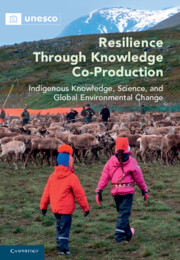 Resilience through Knowledge Co-Production
Resilience through Knowledge Co-Production from Epilogue
Published online by Cambridge University Press: 02 June 2022
The Epilogue summarizes some key general principles to guide the knowledge co-production process as outlined in the Introduction and individual chapters in the book. To create the new intellectual space for rethinking co-production, it is important to view it as a special path, quite different from the previous agenda of documenting Indigenous people’s knowledge for environmental, management and climate mitigation purposes. Its guiding definition is co-production, as being repeatedly argued by Indigenous constituencies worldwide. The Epilogue also addresses the issues of geographic, cultural and historical inequalities in practising co-production and in the acceptance (inclusion) of its outcomes by agencies, governments and academic science. In the early 21st century, knowledge co-production remains an actively ‘negotiated’ process, whose emerging parameters are to influence its eventual application and outcomes.
To save this book to your Kindle, first ensure [email protected] is added to your Approved Personal Document E-mail List under your Personal Document Settings on the Manage Your Content and Devices page of your Amazon account. Then enter the ‘name’ part of your Kindle email address below. Find out more about saving to your Kindle.
Note you can select to save to either the @free.kindle.com or @kindle.com variations. ‘@free.kindle.com’ emails are free but can only be saved to your device when it is connected to wi-fi. ‘@kindle.com’ emails can be delivered even when you are not connected to wi-fi, but note that service fees apply.
Find out more about the Kindle Personal Document Service.
To save content items to your account, please confirm that you agree to abide by our usage policies. If this is the first time you use this feature, you will be asked to authorise Cambridge Core to connect with your account. Find out more about saving content to Dropbox.
To save content items to your account, please confirm that you agree to abide by our usage policies. If this is the first time you use this feature, you will be asked to authorise Cambridge Core to connect with your account. Find out more about saving content to Google Drive.